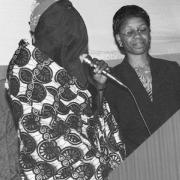Using Social Networking for Innovative Advocacy
Summary Available:
Social networking tools have revolutionized the way that social movements and human rights advocates operate. In a world where the public creates the news in real time and information is readily available in a moment’s notice, the process of communication and dissemination has been largely democratized. Individuals can magnify their voice, not only through information consumption and generation, but through active engagement and organizing. For example, activists of the 2014 Umbrella Revolution in Hong Kong used a mesh networking tool, traditionally used at music festivals, to communicate.


 BAOBAB for Women’s Human Rights, in collaboration with the Civil Resource Development and Documentation Centre (CIRDDOC), highlighted violations of women’s rights in Nigeria that were viewed by the public as normal or even justifiable abuse. They used a mock tribunal to change public perceptions and beliefs regarding violations against women, and changed public policy and law.
BAOBAB for Women’s Human Rights, in collaboration with the Civil Resource Development and Documentation Centre (CIRDDOC), highlighted violations of women’s rights in Nigeria that were viewed by the public as normal or even justifiable abuse. They used a mock tribunal to change public perceptions and beliefs regarding violations against women, and changed public policy and law.